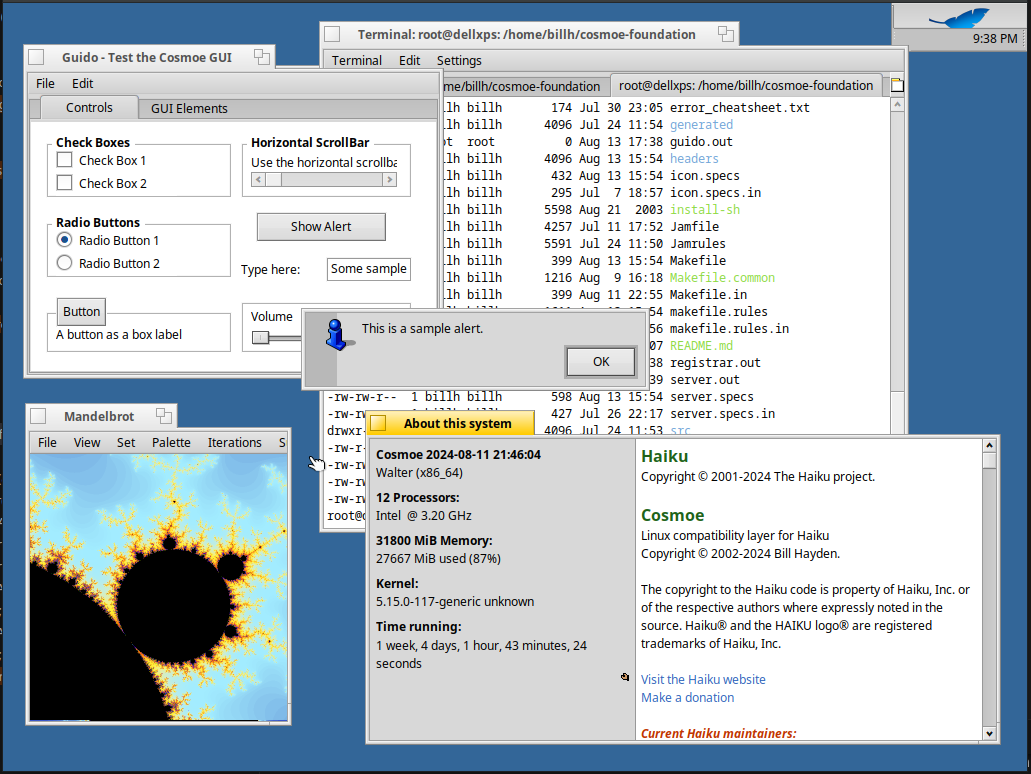
A new generation of Cosmoe
has arrived
Cosmoe - building graphical apps reimagined
The newest iteration of Cosmoe is a C++ UI library for creating rich, easy-to-code graphical apps for Wayland. It brings the benefits of the BeOS class library onto a modern kernel and display engine.

Cosmoe, like BeOS which inspired it, is designed with these goals in mind:
- Extremely easy-to-use GUI classes make for rapid app development
- Highly multi-threaded for maximum performance on modern hardware
- Very low resource usage
Technologies






Testimonials
Portfolio
Necessitatibus eius consequatur ex aliquid fuga eum quidem sint consectetur velit
- All
- App
- Card
- Web
Frequently Asked Questions
How can I try out Cosmoe?
Cosmoe is still a work in progress, and exists as a source-only technology preview for now. To run it, clone or download the Cosmoe source code repo from Gitlab and compile the code on your Linux distribution of choice. There are several sample applications included which demonstrate what it is capable of.
What are the plans for Cosmoe going forward?
Cosmoe needs 2 main improvements to be a reliable, full-featured UI library:
Stability
While I've made incredible strides with getting the BeOS class libraries to talk to Wayland, much work still remains to weed out crashes and incorrect behavior. Wayland is powerful, but not friendly.
Compatibility
Cosmoe implements about 95% of the BeOS API currently. Notable feature that are not yet implemented include "offscreen" BBitmaps for accelerated drawing, and BFilePanel which implements Open and Save dialog boxes. Some file-related classes like BVolume are only partially implemented. Also, for security reasons, Wayland forbids certain Window-related actions such as window positioning and centering, so that functionality can never exist.
For more details on this items and other in-progress aspects of Cosmoe, please see the TODO file in the Cosmoe repo.
What license does Cosmoe use?
Cosmoe is distributed under the MIT license.
What source code comprises Cosmoe? Where did it come from, and what inspired it?
Cosmoe is a fork of the Haiku operating system, which itself is an open-source re-implementation of BeOS. The current iteration of Cosmoe is implemented as a UI library, but the previous iteration (now known as "Cosmoe Classic") was a full port of Haiku to the Linux kernel.
How is the current iteration of Cosmoe different from Cosmoe Classic?
The current iteration of Cosmoe is a shared library which implements the BeOS class library on top of Wayland. There are no supporting programs, e.g. app_server or registrar, needed to use it. All the necessary functionality is rolled into the library. Apps linked with the library run natively on Linux via Wayland.
The previous iteration of Cosmoe (now known as "Cosmoe Classic") is a full port of the Haiku OS to the Linux kernel. It runs inside an SDL window on Linux. It would be possible to develop graphics drivers to allow it to run as its own standalone Linux-based OS, but those have not been developed.
Moving forward, my focus is on the shared library version since I believe it has the most practical benefit.













